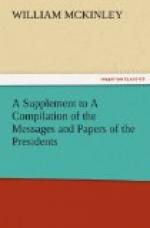The provision of the bill which practically directs a new trial of the claim for $25,000, decided adversely to the claimants more than twenty years ago, is still more objectionable. These parties had their day in court. They produced their witnesses and were heard both originally and upon appeal, and upon the case they were then able to make the court decided they had no claim against the Government. It is now suggested that other witnesses have been discovered who can supply the lack of proof which was produced on the former trial. Such a ground for a new trial would never be considered in any court of law in the land in a case between private parties where such a length of time had intervened since the former trial. No explanation of a satisfactory nature is furnished for the failure of the claimants to produce these witnesses upon the original trial.
The bill further provides that upon a retrial of the original claim, or upon the trial of the new claim, the claimants shall be at liberty to offer in evidence the depositions of witnesses now on the files of any of the committees of Congress in relation to the aforesaid matters, which may be introduced as evidence in case of the death or disability of the deponents.
This provision will enable the claimants to present ex-parte affidavits, prepared by the claimants or their attorneys, without opportunity being afforded to the Government to cross-examine, provided the claimants can show that the deposing witnesses are either dead or under disability, by which, no doubt, is intended any such disability by reason of absence, illness, and the like, as may render them legally incapable of being produced in person to testify upon the retrial. Such a provision as this is most dangerous to the interests of the Government.
I fail to see any reason in the facts connected with these claims for granting to these parties relief of this extraordinary nature.
The Treasury of the United States ought to be very carefully guarded against attacks of those who come forward with stale claims, and especially from the attacks of those who have already been fully heard according to the methods prescribed by the statutes.
To approve this bill would be to furnish a very dangerous precedent which would open the door to demands upon Congress in other cases which have been fully heard and determined.
For these reasons I am constrained to withhold my approval from this bill.
WILLIAM McKINLEY.
EXECUTIVE MANSION, Washington, June 14, 1898.
To the Congress of the United States:
I transmit herewith (having reference to Senate Document No. 4, Fifty-fifth Congress, second session) a report made by Thomas W. Cridler, Third Assistant Secretary of State, who, upon the death of Maj. Moses P. Handy, I designated to continue the work as special commissioner, under the act of Congress approved July 19, 1897, in relation to the acceptance by the Government of the United States of the invitation of France to participate in the International Exposition to be held at Paris from April 15 to November 5, 1900.




